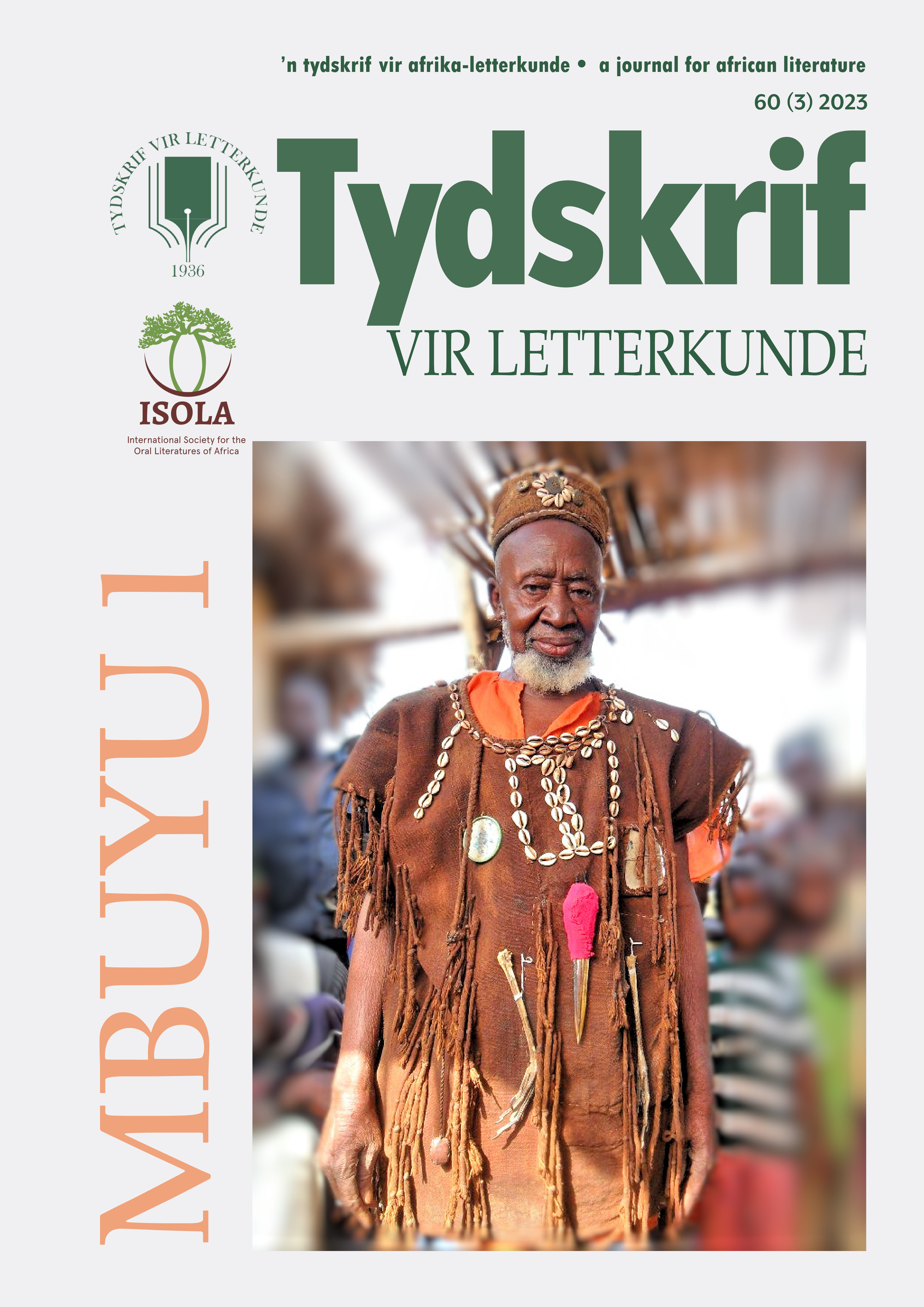Invention of boundaries and identity issues in the story of an anti-colonial war
DOI:
https://doi.org/10.17159/tl.v60i3.14380Keywords:
orality, French West Africa, Bani-Volta War (1915–1916), Bwa revolt/Bobo revolt, anti-colonialism, ethnicization, FacebookAbstract
To what extent do verbal arts contribute to the imposition of worldviews, and indeed to the redrawing of boundaries? I chose to address this question through a performance recital to commemorate a historical event, recorded during a festival organized by a cultural association with the aim of defending the Bwa minority in Mali. The event took place in San in December 2001 and was intended to prepare for the centenary of what is commonly known as the “Bwa revolt”, a resistance movement that took place during the First World War. The study of the recital invites one to question the part of identity reconstruction expressed in this commemoration of the revolt. In this article I argue that the vision of the revolt’s history such as it is proposed in this performance has the effect of inventing boundaries, even though it is a call to integrate into a larger whole. It highlights what can be understood as a paradoxical injunction. Indeed, the public is called to ‘be part of’ a country, while claiming as specific to the Bwa of Mali an event that belongs to the history of a whole region not only populated by the Bwa, and that goes far beyond the borders of what Mali is today. In this performance, one thus witnesses an ethnicization that is built on a rewriting of history, an ethnicization that is also remarkable in the comments exchanged on the commemoration of the revolt on social networks. This article is organized into three points. Firstly, the context of this anti-colonial war and the way it is claimed here as part of the construction of Bwa identity are explored from the very first words. Next, it is shown that the ethnicization manifested in this performance has long-standing political and scientific foundations. Finally, this paradoxical injunction addressed to Malian Bwa to be part of the nation while focusing on their own identity is discussed in a context where identity claims are reinforced by the importance taken by social networks on the internet.
Downloads
Metrics
References
Barth, Fredrik. Ethnic Groups and Boundaries: The social organization of culture difference. George Allen & Uwin, 1969.
Boni, Nazi. Crépuscule des temps anciens: Chronique du Bwamu. Présence africaine, 1962.
Capron, Jean. Communautés villageoises bwa (Mali-Haute Volta). Institut d’ethnologie, 1973.
Coulibaly, Céleste J. M. La guerre du Bani-Volta (1915–16). L’Harmattan, 2017.
Diarra, Joseph T. “Introduction à l’histoire du peuplement du pays bo du Nord-Ouest (Mali): Problématique de l’historicité de l’identité ethnique bo.” MA Thesis. Paris I-Panthéon Sorbonne U, 2006.
Dirlik, Arif. The Postcolonial Aura: Third World Criticism in the Age of Global Capitalism. Westview, 1997.
Echenberg, Myron. Colonial Conscripts. The Tirailleurs sénégalais in French West Africa, 1857–1960. Heinemann, 1991.
Galtier, Gérard. “Internet, outil d’un nouveau discours identitaire soninké.” Afrique contemporaine vol. 4, no. 4, 2011, pp. 149–51. DOI: https://doi.org/10.3917/afco.240.0149.
Gnimien, Gaston. “Révolte bwa de 1915–1916: Le cours d’histoire de l’Inspecteur Gnimien.” Burkina24. 29 Sep. 2016. https://www.burkina24.com/2016/09/29/revolte-bwa-de-1915-1916-le-cours-dhistoire-de-linspecteur-gnimien/.
Leguy, Cécile. “‘Est-ce que vraiment nous comptons?’: Une question d’actualité.” Cahiers de littérature orale Hors-Série, 2020, pp. 117–26. DOI: https://doi.org/10.4000/clo.6896 .
Leguy, Cécile. “Que disent les noms-messages? Gestion de la parenté et nomination chez les Bwa (Mali) (What Do “Message-Names” Say? The Management of Kinship and the Act of Naming among the Bwa (Mali)).” L’Homme no. 197, 2011, pp. 71–92. https://www.cairn-int.info/article-E_LHOM_197_0071--what-do-message-names-say.htm.
Millogo, Louis. Nazi Boni premier écrivain du Burkina Faso: La langue bwamu dans Crépuscule des temps anciens. Pulim, 2002.
Petit Tony. “Super Zamaza—la révolte des bwas.” YouTube. 29 Mar. 2022. https://www.youtube.com/watch?v=bKBANg_k_ns.
Royer, Patrick. “La guerre coloniale du Bani-Volta, 1915–1916 (Burkina-Faso, Mali).” Autrepart vol. 2, no. 2, 2003, pp. 35–51. DOI: https://doi.org/10.3917/autr.026.0035.
Şaul, Mahir. “‘La jarre révolutionnaire bouillait’. 1915–16: guerre anticoloniale dans l’Ouest-Volta.” Les Temps Modernes vol. 693–4, no. 2-3, 2017, pp. 59–86.
Șaul, Mahir & Patrick Royer. West African Challenge to Empire: Culture and History in the Volta-Bani anticolonial War. Ohio U P, 2001.
Vennes, Thomas. “Civiliser et discipliner: la mission civilisatrice et la culture militaire coloniale lors de la guerre du Bani-Volta (1885–1919).” MA Thesis. U du Québec à Montréal, 2020.
Vennes, Thomas. “L’officier, la colonie et l’indigène: conceptions du maintien de l’ordre à travers le ‘Manuel tactique du groupe de l’AOF’ (1910).” Commandement colonial, résistances et décolonisation—Une histoire de l’Afrique contemporaine, edited by Patrick Dramé & Boris Lukic. Sherbrooke, ÉDUS, 2022, pp. 70–90.
Vennes, Thomas. “Understanding Colonial Violence: Military Culture, Colonial Context, and the Civilizing Mission in the Volta-Bani War (1915–16).” Strata University of Ottawa Graduate Student History Review 8, 2018, pp. 87–104.
Vydrin, Valentin et al. Corpus Bambara de référence. 2011–2018. http://cormand.huma-num.fr/.
Wimmer, Andreas. Ethnic Boundary Making. Institutions, Power, Networks. Oxford U P, 2013.
Downloads
Published
How to Cite
Issue
Section
License
Copyright (c) 2023 Tydskrif vir Letterkunde

This work is licensed under a Creative Commons Attribution-ShareAlike 4.0 International License.


 https://orcid.org/0000-0001-6465-6584
https://orcid.org/0000-0001-6465-6584


.png)